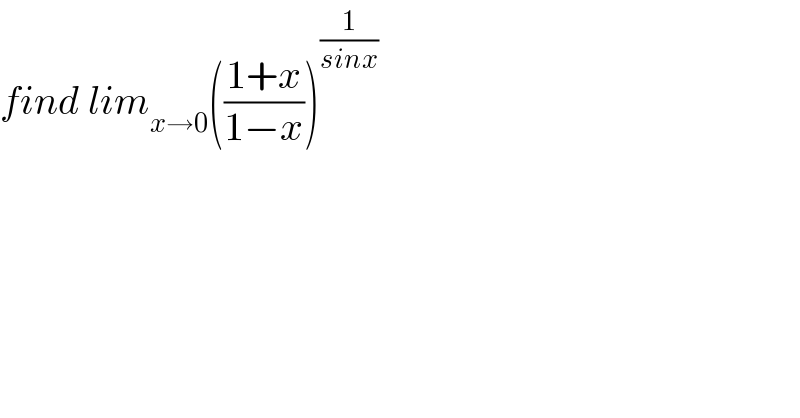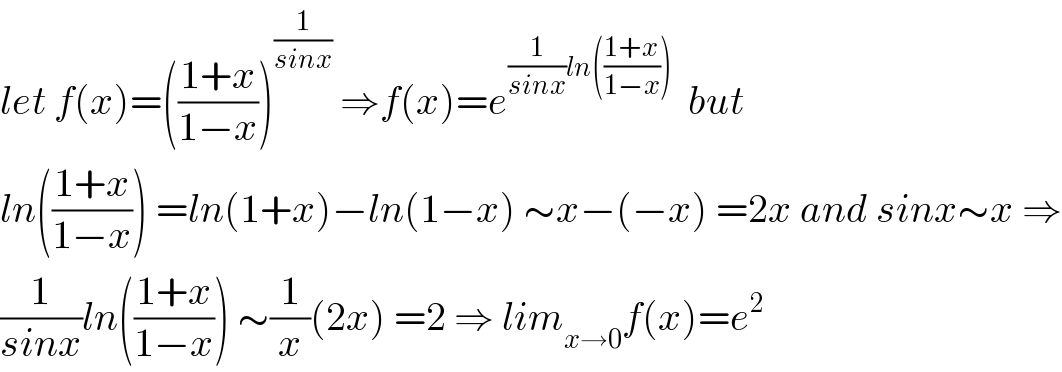
Previous in Relation and Functions Next in Relation and Functions
Question Number 66318 by mathmax by abdo last updated on 12/Aug/19

$${find}\:{lim}_{{x}\rightarrow\mathrm{0}} \left(\frac{\mathrm{1}+{x}}{\mathrm{1}−{x}}\right)^{\frac{\mathrm{1}}{{sinx}}} \\ $$
Commented by mathmax by abdo last updated on 24/Aug/19

$${let}\:{f}\left({x}\right)=\left(\frac{\mathrm{1}+{x}}{\mathrm{1}−{x}}\right)^{\frac{\mathrm{1}}{{sinx}}} \:\Rightarrow{f}\left({x}\right)={e}^{\frac{\mathrm{1}}{{sinx}}{ln}\left(\frac{\mathrm{1}+{x}}{\mathrm{1}−{x}}\right)} \:\:{but} \\ $$$${ln}\left(\frac{\mathrm{1}+{x}}{\mathrm{1}−{x}}\right)\:={ln}\left(\mathrm{1}+{x}\right)−{ln}\left(\mathrm{1}−{x}\right)\:\sim{x}−\left(−{x}\right)\:=\mathrm{2}{x}\:{and}\:{sinx}\sim{x}\:\Rightarrow \\ $$$$\frac{\mathrm{1}}{{sinx}}{ln}\left(\frac{\mathrm{1}+{x}}{\mathrm{1}−{x}}\right)\:\sim\frac{\mathrm{1}}{{x}}\left(\mathrm{2}{x}\right)\:=\mathrm{2}\:\Rightarrow\:{lim}_{{x}\rightarrow\mathrm{0}} {f}\left({x}\right)={e}^{\mathrm{2}} \\ $$
Commented by kaivan.ahmadi last updated on 12/Aug/19

$$={e}^{{lim}_{{x}\rightarrow\mathrm{0}} \left(\frac{\mathrm{1}+{x}}{\mathrm{1}−{x}}−\mathrm{1}\right)×\frac{\mathrm{1}}{{x}}} ={e}^{{lim}_{{x}\rightarrow\mathrm{0}} \left(\frac{\mathrm{2}{x}}{\mathrm{1}−{x}}\right)×\frac{\mathrm{1}}{{x}}} ={e}^{\mathrm{2}} \\ $$$$ \\ $$
Commented by Mikael last updated on 12/Aug/19
![lim_(x→0) [1+(((1+x)/(1−x))−1)]^(1/(sinx)) = lim_(x→0) [(1+((2x)/(1−x)))^((1−x)/(2x)) ]^(((2x)/(1−x)).(1/(sinx))) lim_(x→0) [(1+((2x)/(1−x)))^((1−x)/(2x)) ]=e ,then lim_(x→0) ((2x)/(1−x)).(1/(sinx)) =lim_(x→0) (x/(sinx)).(2/(1−x))= 1×2=2 = e^2](Q66343.png)
$$\underset{{x}\rightarrow\mathrm{0}} {{lim}}\left[\mathrm{1}+\left(\frac{\mathrm{1}+{x}}{\mathrm{1}−{x}}−\mathrm{1}\right)\right]^{\frac{\mathrm{1}}{{sinx}}} =\:\underset{{x}\rightarrow\mathrm{0}} {{lim}}\:\left[\left(\mathrm{1}+\frac{\mathrm{2}{x}}{\mathrm{1}−{x}}\right)^{\frac{\mathrm{1}−{x}}{\mathrm{2}{x}}} \right]^{\frac{\mathrm{2}{x}}{\mathrm{1}−{x}}.\frac{\mathrm{1}}{{sinx}}} \\ $$$$\underset{{x}\rightarrow\mathrm{0}} {{lim}}\:\left[\left(\mathrm{1}+\frac{\mathrm{2}{x}}{\mathrm{1}−{x}}\right)^{\frac{\mathrm{1}−{x}}{\mathrm{2}{x}}} \right]={e}\:,{then}\:\underset{{x}\rightarrow\mathrm{0}} {{lim}}\:\frac{\mathrm{2}{x}}{\mathrm{1}−{x}}.\frac{\mathrm{1}}{{sinx}}\:=\underset{{x}\rightarrow\mathrm{0}} {{lim}}\:\frac{{x}}{{sinx}}.\frac{\mathrm{2}}{\mathrm{1}−{x}}=\:\mathrm{1}×\mathrm{2}=\mathrm{2} \\ $$$$=\:{e}^{\mathrm{2}} \: \\ $$
Commented by mathmax by abdo last updated on 12/Aug/19

$${thanks}\:{sir}. \\ $$
